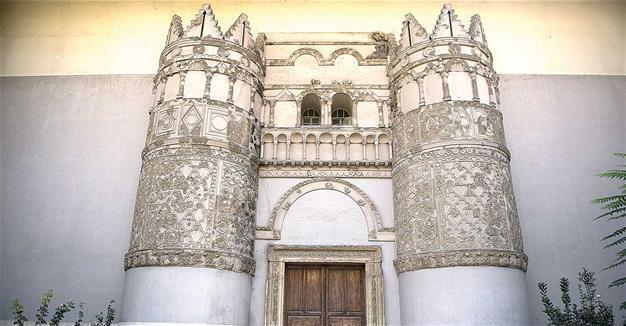Ancient city of Palmyra in intensive care after destruction by ISIL
PALMYRA

Historic artifacts have survived throughout Syria’s rich history but have taken its place amongst an array of those damaged during the six-year war in the country.
The ancient city of Palmyra, which was seized and destroyed by the Islamic State of Iraq and the Levant (ISIL) in 2015, had swung back under the Syrian government’s control early March.
The “wounded” artifacts in the city are now being healed at the National Museum of Damascus. One of them is the Lion of Al-Lat, which symbolizes a goddess.
Once a destination for tourists from around the world, mostly from Turkey, the National Museum of Damascus is now abandoned. There are only two to three students apart from us. Our guide said tourists had stopped coming since 2011, when the civil war began.
The museum, which was opened in 1936, is undergoing restoration right now. Restoration was launched with the thought that the war will end and tourists will begin coming again. Historic artifacts from various parts of Syria are being displayed in its garden. The Lion of Al-Lat is the newest guest.
A local of Palmyra, the lion is on the UNESCO World Heritage List. The 2,000-year-old ancient city changed hands several times between the Syrian government and ISIL, with the jihadist group destroying the city most extensively in 2015. Conflicts still continue in the city.
Goddess under treatment The Lion of Al-Lat, found in pieces by Syrian soldiers, was rescued and carried to museums in Damascus nearly six months ago. The lion was discovered by Polish archaeologists in 1977. Now it is being restored by Polish archaeologists in the museum’s garden.
While its pieces are tried to be attached to each other, the lion’s condition is heartbreaking.
Next to the lion are other artifacts rescued from Daraa and Kuneytr. Waiting for their fate in the garden, they are from the ravaged Hurran Valley. They were seized by soldiers while they were being smuggled abroad through Lebanon and Jordan. Their new home will be the National Museum of Damascus.
Survived for 2,000 yearsA guide showing us around said the city survived for 2,000 years and witnessed many civilizations rule over it.
“The Kingdom of Palmyra was founded in the 2nd century. It was destroyed by the Romans in 273 A.D. It was reestablished by the Byzantines in the 6th century. It has been protected by Muslims for centuries. In the last three to four years, foreigners, who claim to be Muslims, destroyed the history of Syria. They killed all the people and destroyed everything. Pretending to be Muslims, they tried to give a bad name to Islam. The temples they destroyed had been surviving for 2,000 years,” the guide said, referring to the jihadist group.
The guide is hopeful for the future. He wants to show the city around to foreigners who, he believes, will start coming to the city again as of 2019.
 Historic artifacts have survived throughout Syria’s rich history but have taken its place amongst an array of those damaged during the six-year war in the country.
Historic artifacts have survived throughout Syria’s rich history but have taken its place amongst an array of those damaged during the six-year war in the country.